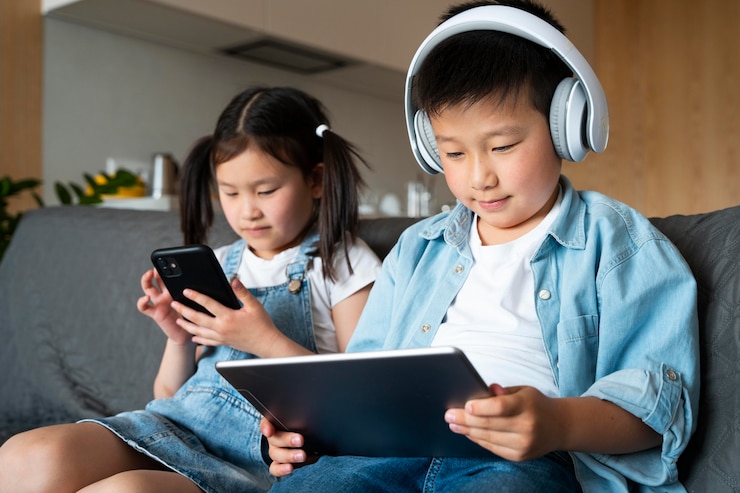
Kids need mental health breaks just as much as adults do. The pressures from school, social interactions, and activities can become overwhelming if not balanced with downtime for relaxation. In this article, we’ll explore 10 mental health activities for children recommended by a mental health professional to help bring emotional balance and renewal to your child.
**Table of Contents**
**”If I allow my child a mental health day, what should we do?”**
This is a common concern for many parents when considering giving their stressed or overwhelmed child a day off from school and other responsibilities. Fortunately, the solution is straightforward and requires no extra planning or spending. While your child might initially want to spend the day glued to a screen, incorporating some of these mental health activities can make their day more fulfilling and refreshing.
Start your day with a discussion about your expectations and let your child pick some activities from the list below to help them regain their calm and confidence.
Here are some of the most effective mental health activities for kids, backed by research and evidence:
**Related Read: 100 Ways to Boost Mental Health**
– **Emotional Connection:** The best way to support your child on a mental health day is by connecting emotionally. This means giving them your full attention and listening deeply to understand their feelings, rather than just preparing a response. Warm and sensitive interactions promote secure, trusting relationships, which boost confidence and emotional health. Studies even suggest that responsive parenting can protect children from toxic stress. With younger kids, connection often happens through play rather than direct conversation.
– **Physical Activity:** Movement is fantastic for mental health. It helps process emotions, releases endorphins, and reduces cortisol levels. Aerobic exercise, in particular, can be as effective as medication and therapy for managing depression and anxiety, and it’s an approach that often feels natural for children. The American Psychological Association notes that active kids generally report lower depression and stress levels, along with a greater sense of satisfaction and well-being.
– **Quiet Time:** Life can sometimes feel like an endless treadmill. Giving your child space for quiet reflection allows their brain to regenerate and offers the perspective needed for growth. Silence offers moments for daydreaming and self-reflection, increasing mindfulness and awareness of what truly matters.
– **Play:** Play is crucial for children’s emotional and cognitive development. It offers a way to release stress and express emotions. Play gives kids control and predictability, which are key for reducing stress. Don’t hesitate to join your child in play and allow them to take the lead.
– **Journaling:** Writing in a journal is a powerful way for children to externalize their feelings safely. It offers a judgment-free zone for self-exploration and creativity. Journaling can help children process emotions, set goals, and solve internal conflicts.
– **Art:** Creating art is another effective way for children to express and regulate their emotions. Art materials offer a safe outlet for feelings, allowing children to convey what they might find difficult to articulate with words.
– **Music:** Music is incredibly calming and can aid relaxation. It helps children learn about self-regulation and stress management, offering both stimulation and relaxation when needed.
– **Healthy Eating:** A mental health day is ideal for encouraging nutritious eating. The link between food and mood is significant; a diet rich in whole, unprocessed foods can positively influence mood and future eating habits.
– **Mindfulness:** If you haven’t tried mindfulness activities with your child, a mental health day is a great opportunity. Mindfulness, such as meditation, involves being present and can shift stress responses to a state of calm and focus. Benefits of mindfulness for kids include improved focus, attention, compassion, and decreased levels of stress and anxiety.
– **Goal Setting:** Use the day to reflect on what’s working and what isn’t, then set goals. This helps your child take responsibility for their behavior and learning. It fosters a positive attitude and creates a lifelong habit of growth and self-improvement.
– **Nature Time:** Spending time in nature has long been known to reduce stress hormones and improve mood. Simply moving regular activities like lunch or reading outdoors can enhance your child’s mental well-being.
These activities not only provide relaxation and reflection but also help reset and recharge your child’s emotional state.
Explore similar articles:
– Kids Need Mental Health Days: 9 Misconceptions That Need to Change Now
– 7 Clear Signs Your Child Needs a Mental Health Day
– 75 Calming Strategies for Kids
– The Best Approach for Parenting a Strong-Willed Child
– 10 Insights from a Family Therapist
This post was initially published on July 12, 2021, and has since been updated.



